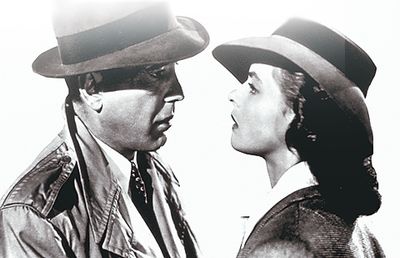Ten cinematic ways to bid farewell

One of the best parts of writing this column has been the opportunity it’s given me to compile lists.
We live in an era of now, one in which treasures of the past aren’t considered particularly relevant. I don’t mean this as a knock, since my generation was as short-sighted as any – maybe even more than most.
After all, we – as I like to point out – did point the way toward today’s youth-centric culture with the cry, “Never trust anyone over 30!”
Still, I did pay attention when elders I respected recommended the works of filmmakers who were, in some cases, active long before I was born.
One of the things these great artists, each in his or her own way, teach us is that life is a series of farewells. In that vein, then, I offer the following 10 films.
“The Long Goodbye” (1973): While there are better Robert Altman films, this take on Raymond Chandler’s novel features many of the standard Altman stylisms – overlapping dialogue, meandering storyline, etc. – and thus it provides a good primer to his overall work. In the end, it has as much in common with Chandler’s novel as Altman’s star, the strangely cast Elliott Gould, does with Robert Mitchum (star of the 1978 adaptation of Chandler’s “The Big Sleep”). So the big goodbye may be to Chandler himself.
“Goodbye Lenin!” (2003): It’s easy to claim that the fall of the Berlin Wall was good for all Germany. But as Wolfgang Becker’s film shows, this new life wasn’t all good for East Germans, whose repressive government had bullied and provided for them. So while Becker’s characters give a goodbye to communism, they extend a cautious welcome to their new freedoms – and obligations.
“Goodbye Mr. Chips” (1939): The film to which all other teacher studies are compared, Sam Wood’s adaptation of James Hilton’s novel is melodramatic to its core. Yet few films have provided more of a lift to the tissue industry than this one, which won star Robert Donat a Best Actor Oscar.
“Casablanca” (1942): Any listing of great films is going to include Michael Curtiz’s war-time saga about nightclub owner Rick Blaine (Humphrey Bogart) and the ménage À trois of Rick, former love Ilsa Lund (Ingrid Bergman) and Ilsa’s husband Victor Laszlo (Paul Henreid). Even if there were no Woody Allen, we’d all recall the airport sequence. And we’d still have Paris.
“Annie Hall” (1978): Speaking of Allen, what is his multi-Oscar winning film but one long, albeit touching and funny, breakup story? Add Alvy Singer’s epilogue (as voiced by Allen) to the expression that Allen’s character wears at the end of his 1979 film “Manhattan,” and you have all the romance-gone-bad bases covered.
“The Way We Were” (1973): Another breakup movie, this one falls under the category of personal guilty pleasure. But being directed by Sydney Pollack, and starring Robert Redford and Barbra Streisand, it does have more quality than you might imagine (though a worthy substitute might be Pollack’s 1985 film “Out of Africa”).
“Titanic” (1997): James Cameron gave his Oscar-winning movie a prologue/epilogue, great special effects, a sweeping story and score to match (by James Horner) and moments of wrenching sadness. But the core of the film is the romance between Rose (Kate Winslet) and Jack (Leonardo DiCaprio), who say goodbye in the icy Atlantic.
“Vertigo” (1958): Investigator John “Scottie” Ferguson (James Stewart) says goodbye not once but twice to the woman of his dreams (Kim Novak both times). Only Alfred Hitchcock could be that twisted.
“La Vita é Bella” (1997): The goodbye here is as funny as it is profoundly sad, coming after the father-son characters played, respectively, by Roberto Benigni and Giorgio Cantarini have survived World War II in a German concentration camp. Many see this film as a Holocaust drama. To me it has always been about sacrifice and paternal love.
“2001: A Space Odyssey” (1968): Based on an Arthur C. Clarke short story, Stanley Kubrick’s film ends by following an astronaut (played by Keir Dullea) as he disappears into a void (represented by a monolith) comprising all the secrets of the universe. The film, then, is, like this column, an extended progression toward one kind of grand goodbye.